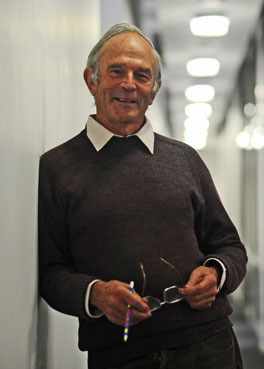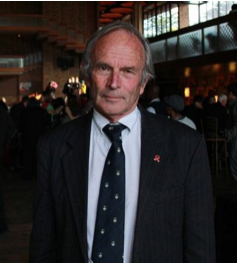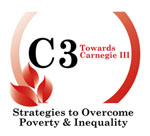
Christmas in South Africa is the time when, like Thanksgiving in America, we think about our families and, where possible, meet to celebrate with our loved ones. While such gatherings are not without their tensions and peculiarities, people continue to gather and celebrate as families because throughout the world families, in their diverse forms, matter.
Families are indeed one of the fundamental building blocks of society, and the well-being of families is a key measure of the health of a country. With this in mind it seems appropriate to begin 2013 with a brief reflection on the state of family life in South Africa. For as we ponder the implications of widespread poverty and deep inequality it becomes increasingly clear that family structure is one of the casualties in the current state of the nation. Consider the following fact: according to a recent OECD report, in the countries of Europe the proportion of children , we have one of the highest rates of father absence in the world and only about a third of pre-school children live in the same homes as their fathers and mothers.* Two out of every three young South African children live in homes where at least one, and often both, parents are absent, while in Europe more than four of every five children up to the age of 14 live with both parents.
In addition, the data now available suggests that only one-quarter of African women aged between 20 and 45 […]
A Child’s Christmas in South Africa
My experience of the Carnegie3 Conference
 Dear Friends,
Dear Friends,
My experience of the Carnegie3 Conference and subsequent travels around South Africa over the past three months, have convinced me that the country is alive with potential – crackling with energy.
I am writing this newsletter on the last day of November from the Missionvale Campus of the Nelson Mandela Metropolitan University, Port Elizabeth. I’ve just spent a fascinating morning with Ivor Baatjes, Director of CIPSET (the Centre for Integrated Post-School Education & Training), set up under the leadership of Vice-Chancellor Derrick Swartz to tackle a problem that lies at the very heart of our search for effective strategies to overcome poverty and inequality. CIPSET has a long agenda, but is focused on undertaking research and thinking to shape the content of training and education needed – in Further Education and Training (FET) Colleges and elsewhere – to transform the lives of people without formal jobs, struggling to make ends meet in neighbouring townships.
Yesterday I spent the morning talking to a local foundation funded by a PE-based company that is doing extraordinary work – not only in literacy and maths education with 100 schools in the city – but also in rethinking the provision of quality housing that begins to bridge the great spatial divide between rich and poor. I spent the afternoon in the company of a young engineer involved in the City’s thrust to develop renewable energy resources. He is convinced that the knowledge and technology is available to develop accessible and affordable energy for cooking by the 50% or more of South Africans for whom electricity is, frankly, too expensive to use. He is excited about the idea of working with others – in […]
Moving forward
 Dear Friends,
Dear Friends,
We are moving forward into the second stage of the Carnegie3 process, exploring and consolidating strategies to overcome poverty and inequality in South Africa. October has been busy – in addition to the usual ‘mopping up’ required after a major conference, there have been three major activities:
- First is the laborious but essential work of preparing materials presented at the September conference – papers, power-point presentations, group discussions – for sharing on the Carnegie 3 website. We aim to achieve this by Christmas, and would be very grateful if all lead authors would email us at , giving permission for their paper and presentation to be made available online. The papers will be downloadable in PDF format, but power point presentations will be embedded in such a way that they may be read on the website, but NOT downloaded nor re-distributed.
- Second is the no less laborious but fascinating work of reading all conference abstracts and papers to inform the report we are drafting for the National Planning Commission , which will highlight the work being done to address poverty and inequality, and identify gaps requiring further research.
- Third are the follow-up visits to discuss and explore possible themes which different universities and other research centres might pursue and co-ordinate, with the help of one or two workshops per theme, over the next two to three years. To date, very fruitful conversations have taken place in Johannesburg, Pretoria, Durban, East London, Alice, Grahamstown, Port Elizabeth and Cape Town. There are still places to be visited and many more conversations to be held, but the initial response is making it possible to begin mapping […]
Towards Carnegie III Review from DG Murray Trust
It’s not often that we have the time to stop; time to stop and explore a little into where we’re going collectively. On the best side, South Africa has continued to surprise even the biggest sceptics with its ability to maintain relative stability and economic calm through stormy financial periods and a larger-than –life World Cup. Yet poverty and inequality; coldly economic terms, continue to threaten every aspect of the Social and Economic well-being of the vast majority of South Africans. The reality is as stark as the gini coefficient. Although so much is already being done; the rift between the top 20% and the bottom 80% of the population isn’t getting any smaller.
The Carnegie process is a metaphor for the power of South Africans to engender significant change. Our history is punctuated with two previous Carnegie Conferences. The first Carnegie Inquiry took place around the time of the Great Depression. The second took place in the 80s and both conferences sought unity between theory and policy which might pave the way to an answer. What has changed so dramatically is the focus of these conferences as Carnegie III marks the first which is inclusive and places equality at its core. Now, so many years after the establishment of our iconic and proudly South African constitutional Democracy, the spotlight, at last, falls on poverty and inequality. We have come a very long way. And the realised aspects of our potential really are evidence of the potential contained in what lies ahead.
In their droves, the sociologists, the activists, the teachers, lecturers, the academic purists, the economists, the students and a beautiful long list of movers and shakers arrived at the Baxter Theatre to put theory […]
Looking back … moving forward
 For five days in early Spring 2012, over 500 participants – from universities, non- governmental organisations and government – gathered at the University of Cape Town to share, discuss and debate strategies to overcome poverty and inequality. The conference inspired hope because it was visible manifestation of the extraordinary energy which exists in South Africa. What was clear is that we can make, and in fact are making, significant advances in overcoming poverty and inequality. But what was also clear was the urgent need to continue sharing ideas and expanding networks that effectively harness this energy.
For five days in early Spring 2012, over 500 participants – from universities, non- governmental organisations and government – gathered at the University of Cape Town to share, discuss and debate strategies to overcome poverty and inequality. The conference inspired hope because it was visible manifestation of the extraordinary energy which exists in South Africa. What was clear is that we can make, and in fact are making, significant advances in overcoming poverty and inequality. But what was also clear was the urgent need to continue sharing ideas and expanding networks that effectively harness this energy.
As Mamphele Ramphele stated at the conference opening, “The success of Carnegie3 will be measured by the success or failure of rooting out the mind-set that tolerates inequalities at the many levels of our society where we as citizens have influence. It has to start with you and me … South Africans have demonstrated that they have it within themselves to tackle similar daunting challenges. We can do it again. Every day from this day forward when you wake up with a fervent determination to change South Africa for the better will count.”
So how can the Carnegie3 process – over the next three years – contribute significantly to transformation? This first stage of Carnegie3 has opened up lines of communication and collaboration. We need to keep those lines open and buzzing to ensure that the promise embodied in our great Constitution increasingly becomes a reality for all our citizens.
With warmest good wishes,

How the house fell down in Marikana – Motlanthe
A mine was like a house and the miners were its occupants. If they left the house, a whole new set of rules pertained.
This was the analogy used by Deputy President Kgalema Motlanthe while answering questions about the violence at Marikana during the closing session of Towards Carnegie III on Friday.
Motlanthe, who is a former Secretary General of the National Union of Mineworkers, gave a detailed explanation of how mine culture worked and the place of rockdrillers in the work process.
He likened a mine to a house, and the miners as its occupants “Inside that house, there are existing house rules and institutions.They know that none of those house rules would permit their effort of getting an increase. So they pull out of the house, they leave the house with its rules and go outside it to form a structure.”
But that structure, he says, now lacks a cohesive leadership. “The unions and the HR people have no vote in this new structure.”
Instead, power falls into the hands of the ‘muti-person’, who performs certain ‘rituals’ to empower the workers.
“The first request of the muti-person is a request for human organs or blood, so their first task is to kill. Once they deliver the ingredients, the ‘ritual’ is performed. Strengthened first by the killing and then by the ritual, they can go and intimidate other workers.”
The workers, without any solid and identifiable leadership, are now particularly hard to deal with.
“None of them represents any collective. As long as they are under that spell, they are under a regimented structure. There is no democracy there.
“The best way to deal with that is to separate them from the muti-person, and to break that spell.”
Motlanthe also warned about the […]
Constant vigilance needed to fight corruption – Motlanthe
The government was a prime target for corrupt activities – with opportunists lining up to sell “anything” to them to take advantage of the state coffers, deputy president Kgalema Motlanthe said yesterday.
“If people sell anything to the government … it goes up. A bottle of water costs R22,” he joked, as he related the tendency of contractors to try and fleece the government.
Answering questions at the closing session of Towards Carnegie III, Motlanthe said the government had to contend with people “both outside and inside the system” who were collaborating to “cheat the system” even though clear processes were in place.
“These tender processes were meant to be rigorous … but if there are people inside a tender adjudicating committee who have a vested interest and if those outside work around the system, then tenders will go to undeserving applicants.
Motlanthe told a story about government procurement that illustrated this point.
“In the Cabinet we try to ensure that there are in-house engineers in departments (to prevent this problem). The Ministry of Health has an in-house engineer and, very recently, they had Public Works indicating to them that the renovations of their head office would cost R23 million.
“Unbeknown to the Public Works people, the resident engineer sat them down and said, “let’s break it down”. He said we could not go beyond R5 million – and yet the quotation was R23 million.
“It is something we are grappling with as Cabinet. It is something we must continue to fight,” Motlanthe said.
“Of course we also have to protect whistle-blowers and ensure they are not victimized so these things can be dealt with decisively,” Motlanthe said.
By Sue Segar
‘This is just the start’
“This is just the beginning” said Professor Francis Wilson, as he mapped the path for Carnegie’s continued progress.
In the main closing address, Deputy President Kgalema Mothlanthe, said this Carnegie Conference marked the first time that research has been conducted “under democratic conditions.
“This allows for much deeper interrogation of the complexities leadting to poverty, deprivation and inequality.”
Wilson, who also addressed the closing event of Towards Carnegie III conference Friday evening. It marked the end of a week when about 500 academics, policymakers, and NGOs came together to try to find practical solutions to South Africa’s enduring problems of poverty and inequality.
Networking, theme building and action were billed by Wilson as key components of the net phase -“learning by doing,” as Trevor Manuel, National Planning minister, put it.
“Where to from here?” asked Wilson. He outlined a set of actions for the next three years. “This is just stage one of a process that continues until 2015 and further,” said Wilson.
“We have to report back to the NPC in three months’ time,” he said. During the conference key gaps had been identified and now a wealth of knowledge had to be “sorted”.
Wilson referred to the “sense of energy” at Towards Carnegie III, and described the networks formed at the conference as “the wires that have joined up this week”.
Wilson highlighted three aspects that have made Towards Carnegie III unique.
He said the conference was the first of its kind to occur as a direct result of government enquiry. He referred to the presence of NGOs as a significant success of the conference. “They have been both devastating and encouraging.”
There had been an “extraordinary response” to the conference from around the country. “We […]
Youth Wage Subsidy – a “step in the right direction”
The proposed Youth Wage subsidy was a step in the right direction in reducing unemployment, but more attention must be paid to issues of skills development and hard job creation.
This was the consensus of associated experts and academics at a panel on Youth Wages and Employment Subsidies.
Under discussion was whether the subsidy could generate the type of youth employment needed by the country.
In its simplified form, the subsidy would target 90% of the youth between the ages of 15 and 24, and lead to the creation of 178,000 new jobs.
The subsidy has been disparaged by Economic Development Minister Ebrahim Patel who believes that it would not only result in insignificant job creation, but displace older workers from the workplace. The ANC has also rejected the subsidy and is advocating for compulsory national service and the implementation of a job seeker’s grant.
Dr Neil Rankin, of the African Micro-Economic Research Unit at the University of the Witwatersrand, who is currently conducting a study into wage-subsidies, said the problem was not labour costs, but worker qualifications.
“Firms worry about the uncertainty that surrounds people’s productivity and their skill. That is a big issue for potential employers.”
David Faulkner, Chief Director of the National Treasury’s Macro-Economic Department stressed the importance of developing skills as a long-term solution.
“ qualifications are not good indicators of quality,” he said. Most attendees were not supportive of the ANC’s job-seeking grant proposal.
“I don’t think they’ve thought it through,” said Rankin. “Would it be used to seek a job, or is it to transfer wealth to the youth? I don’t think the Job Seekers’ grant will result in the outcome they want”.
The Head of the Jobs Fund at the Treasury, Najwah Allie-Edries, said the […]
Rural health organisation goes national at conference
A rural development organisation that recruits and supports health-care workers has already seen results after attending Towards Carnegie III.
Now the Umthombo Youth Development Foundation, which operates in Northern KwaZulu-Natal, is about to go nation-wide thanks to a discussion between its director, Dr Gavin MacGregor and Aaron Daviet, who is Political Officer at the U.S. Consulate General in Cape Town.
“The conference was not in vain. While others were still breaking down the ideas to tackle poverty on different levels, we are already planning to bring together our forces and continue doing what we are already doing to bring about immediate change”, said MacGregor.
The UYDF recruits and supports rural youth to become qualified health care professionals in order to address the critical shortage of health-care workers in rural hospitals. In the process, it hopes to improve the health care in rural communities.
After training, these young health-care professionals work at one of the 10 partnering hospitals in the Umkhanyakude, Zululand or Uthungulu districts in return for the opportunity they have had to study a health science qualification. But until now the initiative has been limited to Northern KwaZulu Natal due to financial constraints, says MacGregor.
In the past 12 years, the organisation has produced 116 health care professionals in 16 health science disciplines, including 37 doctors, according to a paper presented to the conference by MacGregor.
During the conference, MacGregor was able to explain to several people the impact UYDF has had in the rural northern KZN since 1999.
Among them was Aaron Daviet of the U.S. Consulate.
MacGregor and Daviet have now joined forces to enable the UYDF initiative in other provinces. Daviet had to leave the conference early, hence was not available […]
